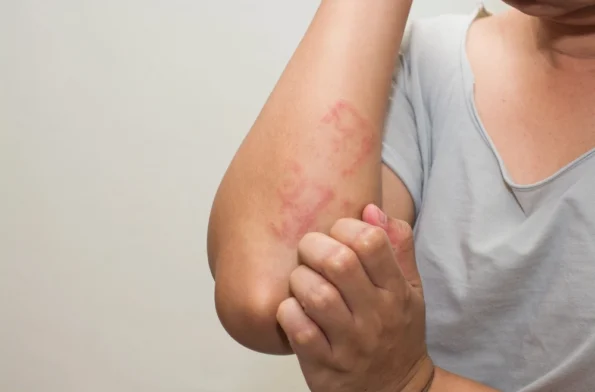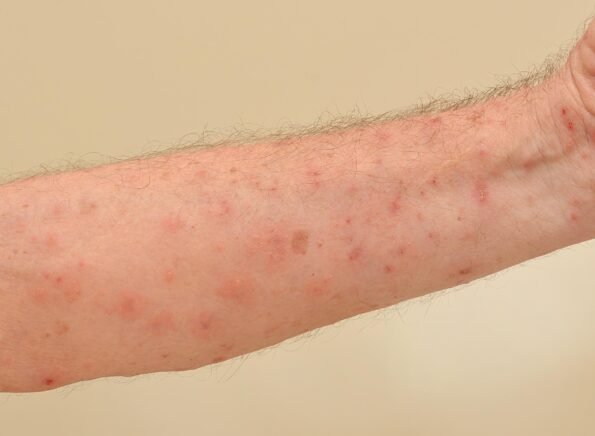If you’re looking to get rid of scabies naturally or with over-the-counter (OTC) medications, understanding your options is critical. Scabies, caused by tiny skin mites on humans known as Sarcoptes scabiei, leads to relentless itching, redness, and discomfort. Fortunately, there are several effective scabies remedies, from natural DIY treatments to OTC medicines. Here, we’ll explore these methods to help you determine the best approach for your situation.

What Is Scabies?
Scabies is a highly contagious skin condition caused by microscopic mites burrowing into the skin. These mites lay eggs, triggering intense itching and a red, bumpy rash. The condition spreads through prolonged skin-to-skin contact, making it common in crowded living situations. Early detection and treatment are crucial to prevent spreading and secondary infections.
DIY Remedies to Get Rid of Scabies Naturally
For those seeking natural alternatives to harsh chemicals, DIY remedies may offer some relief. While these remedies may not always completely eliminate scabies, they can alleviate symptoms and support recovery.
1. Tea Tree Oil
Tea tree oil is a popular natural remedy known for its antimicrobial and anti-inflammatory properties. Research suggests that tea tree oil can kill scabies mites and reduce itching. To use it:
- Mix 10 drops of tea tree oil with a tablespoon of coconut oil.
- Apply the mixture directly to the affected areas twice daily for two weeks.
2. Neem Oil
Neem oil is another powerful remedy for scabies. Its natural properties help disrupt the mites’ life cycle. Apply neem oil directly to the skin, leave it on for 30 minutes, and rinse off with warm water. Repeat daily until symptoms subside.
3. Clove Oil
Clove oil’s insecticidal properties can help eliminate scabies mites. Dilute a few drops of clove oil with a carrier oil like olive or coconut oil and apply it to the skin. Use this remedy twice a day for best results.
4. Aloe Vera
Aloe vera is widely known for soothing irritated skin. It doesn’t kill mites but helps reduce itching and inflammation. Apply fresh aloe vera gel to affected areas, leave it on for 30 minutes, and rinse off. Repeat this process several times a day.
5. Turmeric Paste
Turmeric has natural anti-inflammatory and antimicrobial properties. Create a paste with turmeric powder and water, apply it to the affected areas, and leave it on for 1 hour before rinsing off. This remedy can help reduce itching and irritation.

Over-the-Counter Medications for Scabies
While natural remedies can provide relief, OTC medications are often more reliable in completely eradicating scabies mites. If you’re looking for the best medicine for scabies, consider these common OTC options:
1. Permethrin Cream
Permethrin is a first-line treatment for scabies and is available OTC in some regions. This topical cream kills both mites and their eggs. Apply a thin layer to the entire body, leave it on for 8–14 hours, and rinse off. Follow your healthcare provider’s recommendations for reapplication.
2. Sulfur Ointments
Sulfur-based creams and ointments are effective in killing scabies mites. These are safe for use even in sensitive groups, such as children and pregnant women. Apply sulfur ointments nightly for a week for best results.
3. Crotamiton Lotion
Crotamiton is another effective scabies remedy available OTC. It not only kills mites but also provides relief from itching. Apply as directed for up to five days.
4. Hydrocortisone Cream
While hydrocortisone cream doesn’t kill scabies mites, it helps reduce inflammation and itching. Use it in combination with other treatments for symptom relief.

DIY vs. OTC: Which Is Better?
Advantages of DIY Remedies
- Natural ingredients are less likely to cause side effects.
- Budget-friendly and easy to prepare at home.
- Can soothe symptoms like itching and redness.
Disadvantages of DIY Remedies
- May not completely eradicate mites.
- Effectiveness varies from person to person.
- Requires consistent application for extended periods.
Advantages of OTC Medications
- Scientifically proven to kill mites and eggs.
- Faster results compared to DIY treatments.
- Widely available without a prescription.
Disadvantages of OTC Medications
- May cause side effects like irritation or redness.
- Some products are not suitable for all skin types.
- Often more expensive than natural remedies.
Prevention Tips to Avoid Recurrence
Getting rid of scabies is only half the battle. Preventing reinfestation is equally important. Follow these steps:
- Wash Bedding and Clothing: Use hot water to wash all clothing, bedding, and towels. Dry them on high heat.
- Vacuum Thoroughly: Vacuum carpets, furniture, and any areas where mites might linger.
- Avoid Close Contact: Limit skin-to-skin contact with infected individuals until treatment is complete.
- Treat Close Contacts: Ensure everyone in the household is treated to prevent reinfection.
External Resources
For more detailed information about scabies treatment and prevention, visit reputable health websites:
Final Thoughts
When deciding between DIY remedies and OTC medications, consider the severity of your scabies and your personal preferences. Natural remedies may work for mild cases or symptom relief, but OTC medications are often more reliable for completely eliminating mites. Regardless of your choice, consistency is key to ensuring scabies are eradicated and do not return.
If symptoms persist or worsen, consult a healthcare professional for guidance. Taking prompt action is the best way to protect your health and comfort.

